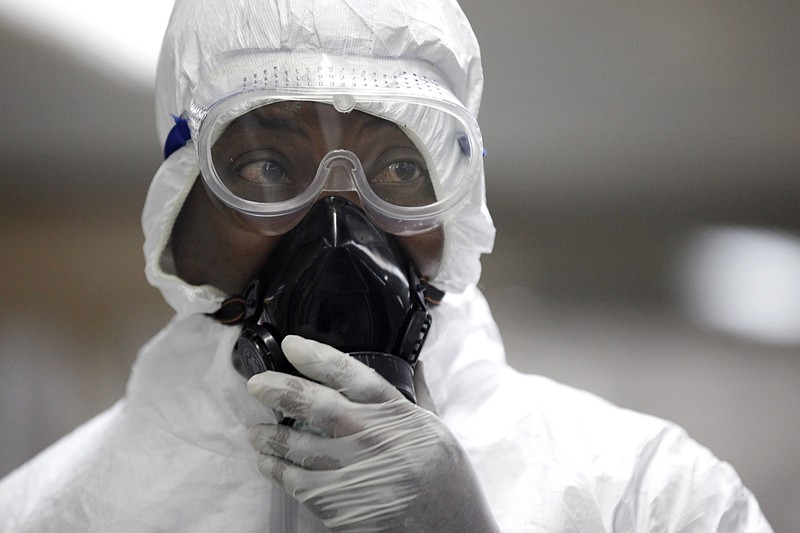READ MORE2nd American aid worker with Ebola arrives in U.S.
You know, this is how "The Walking Dead" started.
A deadly virus.
With no cure.
In Atlanta.
That infects hundreds, then thousands, then hits pandemic-level.
And poof, civilization gone by the weekend.
Don't tell me you haven't thought it -- the connection between Ebola-infected Americans arriving in Atlanta and the plot line of the century's best zombie show.
The real Ebola? It's killed close to 900 Africans, mainly in Liberia, Sierra Leone and Guinea, with new deaths being reported in Nigeria and new symptoms reported in one Saudi Arabian man who just returned from Sierra Leone. (Symptoms are nightmarish: raging fever, bleeding from eyes, ears and mouth.)
It is an incurable virus, with a mortality rate pushing 90 percent. Yet as far as incurable viruses go, this one's a China doll.
"Incredibly fragile," CNN reported.
It is spread only through bodily fluids -- blood, vomit, diarrhea -- which means it is not airborne. A cold is easier to catch. And here in America, with the U.S. Centers for Disease Control and Prevention's expertise and isolation units commonplace in hospitals, Ebola can be quarantined, roadblocked and stopped.
So why are we so anxious about this?
"There is no more effective contagion than fear," screenwriter Scott Z. Burns wrote in Time magazine. "To contract it you do not need to have contact with bodily fluids, only limited exposure to sensationalizing media or a water-cooler conversation embellished with misinformation."
In our media-soaked minds, this is how it all starts: Ebola is the first horseman of the coming apocalypse, the bloody disease that unravels everything. After all, that's what happens in "World War Z" and "28 Days Later," not to mention the uncountable pop culture references, images and memes devoted to predicting, prepping for or surviving the apocalypse.
"One of the most popular apps right now is called 'Plague Inc.,'" my friend said. "The point of the game is to develop a virus that destroys the world."
And in walks Ebola, the perfect guest in our fear-based story line.
Know what?
We should be more worried about texting and driving. (Last year, more than 18,500 Tennesseans were involved in crashes related to distracted driving.)
Or the flu, which killed more than 200,000 people around the world in 2009. Last year, the CDC reported that 90 percent of all American children who died from the flu were not vaccinated. To worry about Ebola yet not get a flu shot this fall is paradoxically irrational.
So I don't think we fear Ebola, so much as the thought of it.
And such a fear is an extravagance and a distraction.
Because this is not about us.
It's about places in the world we would not even recognize.
It's about West Africa, and countries like Guinea, which has a per capita annual income of $527, and Sierra Leone, with its life expectancy rate of 45 years, and Liberia, where the government spends about $19 per person on health.
It's about a blend of misunderstandings, cultural taboos and native fear of outsiders that allow Ebola to thrive. Medical workers are reporting another crisis, as many West Africans refuse medical care -- some have chased off the Red Cross -- clinging to very old traditions of folklorish medicine that only serve to spread the disease, not isolate it.
"Workers and officials, blamed by panicked populations for spreading the virus, have been threatened with knives, stones and machetes, their vehicles sometimes surrounded by hostile mobs. Log barriers across narrow dirt roads block medical teams from reaching villages where the virus is suspected. Sick and dead villagers, cut off from help, are infecting others," The New York Times reported.
It's also about the slow-moving Ebola that is this statistic: nearly 18,000 children around the globe die each day, mostly from things that can be prevented.
Malnutrition. Dirty water. Pneumonia. Complications at birth. Malaria.
Many of those children live in these west African countries, places with a nightmarish history of civil war, rape, torture and violence.
To them, all our fears would be a luxury.
"Ebola is simply a new scream heard above that terrible background din," journalist Laurie Garrett wrote on CNN.
At least we can turn off the TV.
Contact David Cook at dcook@timesfreepress.com or 423-757-6329. Follow him on Facebook and Twitter at DavidCookTFP.

